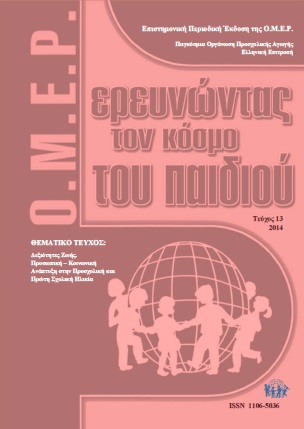POLICIES AND PRACTICES FOR SUCCESSFUL PARENTAL INVOLVEMENT IN THE EDUCATION OF THE CHILD

Abstract
necessity for finding information, regarding families’ talents and potential, understanding the specific situations of the families, knowledge on the variety of avenues that can be used, the need of building confidence, linguistic and cultural appreciation, recognition and response, the introduction of parents in program planning and constant assessment of these programs, in order to maintain and improve them.
Article Details
- How to Cite
-
Κούτρας (Vasilios Koutras) Β., & Νάστου (Lamprini Nastou) Λ. (2014). POLICIES AND PRACTICES FOR SUCCESSFUL PARENTAL INVOLVEMENT IN THE EDUCATION OF THE CHILD. Investigating the child’s World, 13, 247–254. https://doi.org/10.12681/icw.17953
- Section
- Scientific articles & educational projects

This work is licensed under a Creative Commons Attribution-NonCommercial 4.0 International License.
Authors who publish with this journal agree to the following terms:
· Authors retain copyright and grant the journal right of first publication with the work simultaneously licensed under a Creative Commons Attribution Non-Commercial License that allows others to share the work with an acknowledgement of the work's authorship and initial publication in this journal.
· Authors are able to enter into separate, additional contractual arrangements for the non-exclusive distribution of the journal's published version of the work (e.g. post it to an institutional repository or publish it in a book), with an acknowledgement of its initial publication in this journal.
· Authors are permitted and encouraged to post their work online (preferably in institutional repositories or on their website) prior to and during the submission process, as it can lead to productive exchanges, as well as earlier and greater citation of published work.


